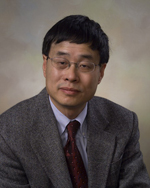Lee Hsun Lecture Series
Topic: Electrocaloric Cooling for A Sustainable World
Speaker: Prof. Q. M. Zhang
The Pennsylvania State University, University Park
Pennsylvania 16802, USA
Time: 10:00-12:00, (Fri.) May 19th, 2023
Venue: Room 468,Lee Hsun Building, IMR CAS
Abstract
 Our society is highly dependent on reliable cooling for air conditioning (AC) and refrigeration. Currently, modern cooling is supported by a 19th century technology: vapor compression cycle (VCC)-based cooling. Refrigerants used in the VCC cooling are strong greenhouse gases and thus are among the leading causes of global warming. On top of the negative environmental impact, AC and refrigeration are one of the largest energy users, consuming more than 25% of electricity generated in the developed countries. Caloric cooling, such as these based on magnetocaloric effect (MCE), electrocaloric effect (ECE), elasto(baro)caloric effect (eCE/BCE), are environmentally benign and have potential of higher efficiency, and thus have emerged as attractive and promising alternatives to the VCC cooling. The caloric effects are the reversible temperature and entropy change of solid-state materials under magnetic (MCE), electric (ECE), and elastic stress (eCE/BCE) simulations. The world-wide active EC materials research since late 2000s has revealed giant ECE in a number of ferroelectrics and their composites. These EC materials, coupled with direct utilization of electric stimulation in driving the EC bodies, have enabled design and demonstrations of EC device prototypes, which featured compact device size and high cooling power density. These EC materials and device studies further advanced understanding of EC materials and what required for practical EC cooling device systems, e.g., developing EC materials that generate large ECE at low electric fields with long operating life cycle. This talk will present the advancements in the EC materials and solid-state EC cooling devices, especially, the recent breakthroughs in the EC materials that generate giant ECE at ultra-low electric fields and their related EC devices.
Our society is highly dependent on reliable cooling for air conditioning (AC) and refrigeration. Currently, modern cooling is supported by a 19th century technology: vapor compression cycle (VCC)-based cooling. Refrigerants used in the VCC cooling are strong greenhouse gases and thus are among the leading causes of global warming. On top of the negative environmental impact, AC and refrigeration are one of the largest energy users, consuming more than 25% of electricity generated in the developed countries. Caloric cooling, such as these based on magnetocaloric effect (MCE), electrocaloric effect (ECE), elasto(baro)caloric effect (eCE/BCE), are environmentally benign and have potential of higher efficiency, and thus have emerged as attractive and promising alternatives to the VCC cooling. The caloric effects are the reversible temperature and entropy change of solid-state materials under magnetic (MCE), electric (ECE), and elastic stress (eCE/BCE) simulations. The world-wide active EC materials research since late 2000s has revealed giant ECE in a number of ferroelectrics and their composites. These EC materials, coupled with direct utilization of electric stimulation in driving the EC bodies, have enabled design and demonstrations of EC device prototypes, which featured compact device size and high cooling power density. These EC materials and device studies further advanced understanding of EC materials and what required for practical EC cooling device systems, e.g., developing EC materials that generate large ECE at low electric fields with long operating life cycle. This talk will present the advancements in the EC materials and solid-state EC cooling devices, especially, the recent breakthroughs in the EC materials that generate giant ECE at ultra-low electric fields and their related EC devices.